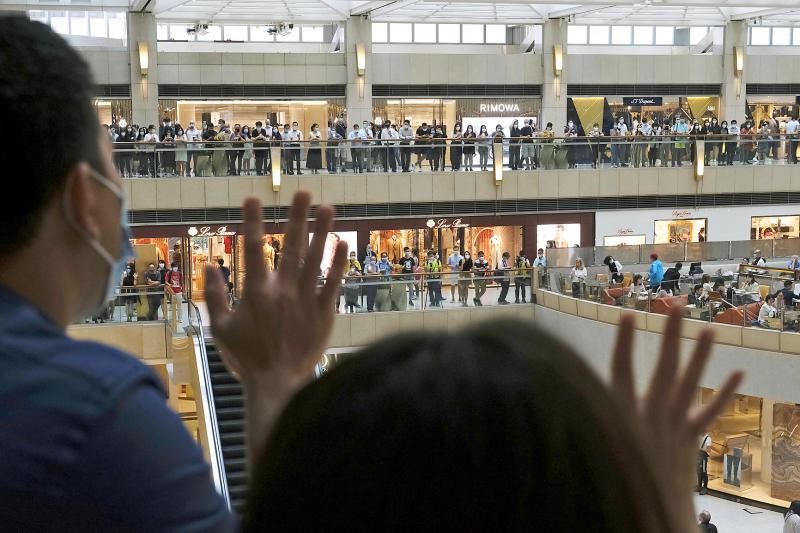The Chinese National People’s Congress (NPC) yesterday endorsed national security legislation for Hong Kong that has prompted new protests in the territory.
Lawmakers approved the bill by a vote of 2,878 to one with six abstentions, in line with the largely ceremonial body’s custom of near-unanimous support for legislative changes decided by the Chinese Communist Party.
The bill would alter Hong Kong’s Basic Law to require the territory to enforce measures to be decided by the NPC Standing Committee, which handles most lawmaking work.

Photo: Bloomberg
It reflects the determination of Chinese President Xi Jinping’s (習近平) government to tighten control over Hong Kong following 11 months of anti-government protests.
Activists in Hong Kong say the legislation would undermine the “high degree of autonomy” promised to the former British colony when it was handed back to China in 1997 under a “one country, two systems” framework and might be used to suppress political activity.
Chinese Premier Li Keqiang (李克強) said that it is consistent with Beijing’s promises.

Photo: AFP
“The decision adopted by the NPC session is designed for steady implementation of ‘one country, two systems,’ and Hong Kong’s long-term prosperity and stability,” Li told a news conference.
The proposed legislation led US Secretary of State Mike Pompeo on Wednesday to announce that Washington would no longer treat Hong Kong as autonomous from Beijing.
That could hurt the territory’s attractiveness as a business center.
Li called for mutual respect and Sino-US cooperation to promote “extensive common interests” in resolving global problems, and promoting trade, science and other fields.
“Both countries stand to gain from cooperation and lose from confrontation,” Li said.
Pompeo notified the US Congress that the administration of US President Donald Trump no longer regards Hong Kong as autonomous from mainland China.
“Hong Kong does not continue to warrant treatment under United States laws in the same manner as US laws were applied to Hong Kong before July 1997,” Pompeo said in a statement.
Pompeo’s certification came amid calls in the US and elsewhere for Washington and others to react against Beijing imposing its national security legislation on Hong Kong.
After sending the notification to Capitol Hill, Pompeo spoke by telephone with British Secretary of Foreign and Commonwealth Affairs Dominic Raab.
The two agreed that China “must honor its commitments and obligations under the Sino-British Joint Declaration.”
The US, the UK, Canada and Australia yesterday issued a joint statement, saying that China is violating its international obligations.
“China’s decision to impose the new national security law on Hong Kong lies in direct conflict with its international obligations under the principles of the legally binding, UN-registered Sino-British Joint Declaration. The proposed law would undermine the ‘one country, two systems’ framework,” the statement said.
Additional reporting by AFP

Right-wing political scientist Laura Fernandez on Sunday won Costa Rica’s presidential election by a landslide, after promising to crack down on rising violence linked to the cocaine trade. Fernandez’s nearest rival, economist Alvaro Ramos, conceded defeat as results showed the ruling party far exceeding the threshold of 40 percent needed to avoid a runoff. With 94 percent of polling stations counted, the political heir of outgoing Costa Rican President Rodrigo Chaves had captured 48.3 percent of the vote compared with Ramos’ 33.4 percent, the Supreme Electoral Tribunal said. As soon as the first results were announced, members of Fernandez’s Sovereign People’s Party

MORE RESPONSIBILITY: Draftees would be expected to fight alongside professional soldiers, likely requiring the transformation of some training brigades into combat units The armed forces are to start incorporating new conscripts into combined arms brigades this year to enhance combat readiness, the Executive Yuan’s latest policy report said. The new policy would affect Taiwanese men entering the military for their compulsory service, which was extended to one year under reforms by then-president Tsai Ing-wen (蔡英文) in 2022. The conscripts would be trained to operate machine guns, uncrewed aerial vehicles, anti-tank guided missile launchers and Stinger air defense systems, the report said, adding that the basic training would be lengthened to eight weeks. After basic training, conscripts would be sorted into infantry battalions that would take

GROWING AMBITIONS: The scale and tempo of the operations show that the Strait has become the core theater for China to expand its security interests, the report said Chinese military aircraft incursions around Taiwan have surged nearly 15-fold over the past five years, according to a report released yesterday by the Democratic Progressive Party’s (DPP) Department of China Affairs. Sorties in the Taiwan Strait were previously irregular, totaling 380 in 2020, but have since evolved into routine operations, the report showed. “This demonstrates that the Taiwan Strait has become both the starting point and testing ground for Beijing’s expansionist ambitions,” it said. Driven by military expansionism, China is systematically pursuing actions aimed at altering the regional “status quo,” the department said, adding that Taiwan represents the most critical link in China’s

‘REALLY PROUD’: Nvidia would not be possible without Taiwan, Huang said, adding that TSMC would be increasing its capacity by 100 percent Nvidia Corp CEO Jensen Huang (黃仁勳) on Saturday praised and lightly cajoled his major Taiwanese suppliers to produce more to help power strong demand for artificial intelligence (AI), capping a visit to the country of his birth, where he has been mobbed by adoring fans at every step. Speaking at an impromptu press conference in the rain outside a Taipei restaurant, where he had hosted suppliers for a “trillion-dollar dinner,” named after the market capitalization of those firms attending, Huang said this would be another good year for business. “TSMC needs to work very hard this year because I need a lot